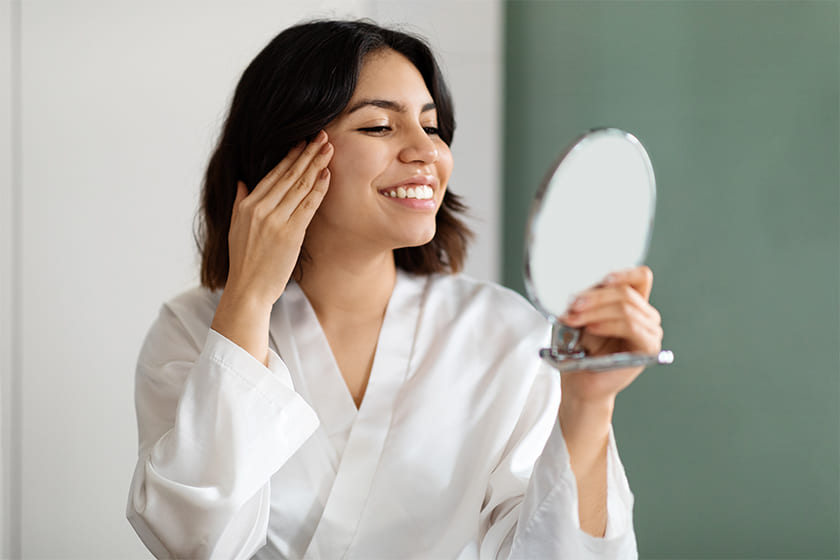The Ultimate Nighttime Skincare Routine for Healthy, Glowing Skin

A solid nighttime skincare routine is one of the best things you can do for your skin. While you sleep, your skin works hard to repair and rejuvenate itself, making it the perfect time to give it a little extra care.
If you want to wake up with fresh, radiant skin, follow this step-by-step routine!
Step 1: Remove Your Makeup
Sleeping with makeup on is a big no-no—it can clog your pores, lead to breakouts and even cause premature aging. Start by using a gentle makeup remover, micellar water, or cleansing oil to get rid of any makeup, dirt, or excess oil.
Step 2: Cleanse Your Face
Once your makeup is off, cleanse your skin to remove any remaining impurities. Use a mild, hydrating cleanser suited to your skin type to ensure a clean and fresh base without stripping your skin’s natural moisture.
Step 3: Exfoliate (2-3 Times a Week)
Exfoliation helps get rid of dead skin cells, unclogs pores, and promotes cell turnover for a smoother, brighter complexion. Use a gentle scrub or a chemical exfoliant (like AHAs or BHAs) a few times a week to keep your skin looking fresh and healthy.
Step 4: Apply Toner
A toner helps restore your skin’s pH balance and preps it for better absorption of the next skincare products. Depending on your skin’s needs, choose a hydrating toner if your skin feels dry or a soothing toner if your skin is sensitive.
Step 5: Apply a Serum
Serums are packed with active ingredients that target specific skin concerns. Choose one based on your needs:
-
Hyaluronic Acid for deep hydration
-
Vitamin C for brightening and evening out skin tone
-
Retinol for anti-aging and fine lines (use this only if your skin tolerates it well)
Step 6: Apply Eye Cream
The skin around your eyes is delicate and prone to fine lines, dark circles, and puffiness. A hydrating eye cream can help keep this area plump and refreshed. Gently tap it in with your ring finger to avoid tugging on the skin.
Step 7: Moisturize
Lock in all the goodness by applying nourishing moisturizer. If you have dry skin, go for a richer cream. If you have oily skin, a lightweight gel-based moisturizer will work best. The key is to ensure your skin stays hydrated overnight.
Step 8: Use an Overnight Treatment (Optional)
If your skin needs a little extra love, consider applying an overnight treatment like a sleeping mask or a repair cream. Ingredients like niacinamide, peptides, or ceramides can help restore and strengthen your skin barrier.
Step 9: Take Care of Your Lips
Don’t forget about your lips! Apply a nourishing lip balm or lip mask to keep them soft and prevent dryness or chapping.
Step 10: Get Your Beauty Sleep
Skincare products can only do so much—your skin also needs proper rest! Try to get 7-8 hours of quality sleep to allow your skin to repair, regenerate, and glow naturally.
Final Thoughts
Consistency is key when it comes to skincare! By following this simple yet effective nighttime routine, you’ll give your skin the care it needs to stay healthy, radiant, and youthful.
FAQs
1. How often should I follow this nighttime skincare routine?
Every night! However, exfoliation should only be done 2-3 times a week to avoid irritation.
2. Can I skip toner?
Yes, but toner helps balance your skin and enhances the absorption of other products. If your skin feels fine without it, you can skip it.
3. Can I use multiple serums at night?
Yes, but be mindful of ingredient combinations. Hyaluronic acid works well with most serums, but retinol and vitamin C should be used on separate nights to avoid irritation.
4. Do I need a different moisturizer for day and night?
Night creams are usually richer and contain ingredients like ceramides and peptides for overnight repair. If your daytime moisturizer lacks these, it’s best to use a dedicated night cream.
5. Should I apply sunscreen at night?
No, sunscreen is only needed during the day to protect against UV rays. At night, focus on hydration and repair.
By following this routine consistently, you’ll wake up with refreshed, glowing skin every morning!

Reviewed By
Dr. Sapna Kangotra
Senior Ayurveda Doctor




Comments